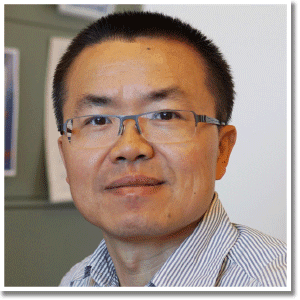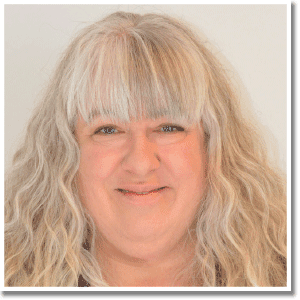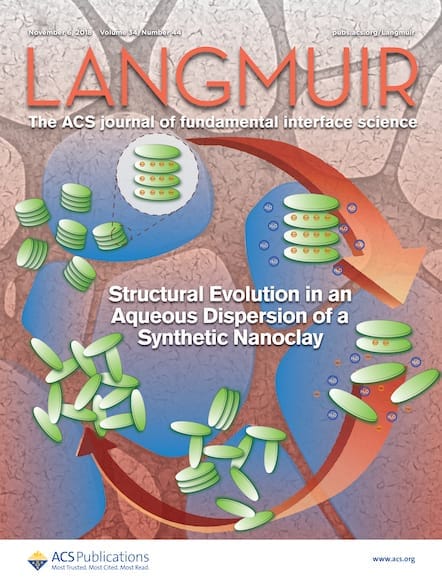Langmuir and the ACS Division of Colloid & Surface Chemistry are proud to announce Professors Yadong Yin (University of California, Riverside) and Janet A. W. Elliott (University of Alberta) as the winners of the 2022 Langmuir Lectureship Award. The award recognizes individuals working in the interdisciplinary field of colloid and surface chemistry. Professor Yadong Yin […]

Langmuir and the ACS Division of Colloid & Surface Chemistry are proud to announce Professors Yadong Yin (University of California, Riverside) and Janet A. W. Elliott (University of Alberta) as the winners of the 2022 Langmuir Lectureship Award. The award recognizes individuals working in the interdisciplinary field of colloid and surface chemistry.
- Professor Yadong Yin was awarded the 2022 Langmuir Lectureship Award for elucidating fundamental mechanisms of nanocrystal core and surface transformations, generating precise control over nanocrystal structure and the assembly of useful colloidal materials.
- Professor Janet A. W. Elliott was awarded the 2022 Langmuir Lectureship Award for advancing interfacial thermodynamics, and the roles of osmotic transport of water, the diffusive transport of cellular protectants, and freezing in confined spaces, that enabled a transformation in the field of cryopreservation.
Get to Know the Winners
Professor Yadong Yin

Yadong Yin is a Professor of Chemistry at the University of California, Riverside, with an affiliate appointment in Materials Science and Engineering. He received his B.S. and M.S. in Chemistry from the University of Science and Technology of China in 1996 and 1998, respectively, and then Ph.D. in Materials Science and Engineering from the University of Washington in 2002. In 2003, he worked as a postdoctoral fellow at the University of California, Berkeley, and later the Lawrence Berkeley National Laboratory, and then became a staff scientist at the LBNL in 2005. He joined the faculty at the University of California, Riverside, in 2006.
He is a recipient of several awards, including the Cottrell Scholar Award (2009), DuPont Young Professor Grant (2010), 3M Nontenured Faculty Grant (2010), NSF CAREER award (2010), NML Researcher Award (2016), and MRS Fellow (2020). His research interests include the synthesis, self-assembly, colloidal and interfacial properties, and applications of nanostructured materials.
What does winning this award mean to you?
I am extremely honored to receive this recognition from the colloid and surface science community. From the beginning of my research career, I have recognized the important role of surface chemistry in determining the growth and interaction of colloidal nanoparticles. This award will inspire my research group to develop new surface chemistry tools to grow and assemble nanomaterials with unprecedented properties.
What are the major challenges facing your field today?
After many years of research, people can now produce a large variety of nanostructures with controlled composition, size, shape, and surface properties. However, little is known about the nucleation process, which plays a decisive role in subsequent growth, like genes in biological systems. Also, it has been challenging to determine and control the distribution of capping ligands on the nanoparticle surface, which are critical for their precise assembly into secondary structures with desired properties and functions.
What exciting projects are you currently working on?
We are currently working on controlling the synthesis of colloidal nanostructures by combining seed-mediated growth and templating methods. This new synthetic strategy has the advantages of high generalizability, reproducibility, and scalability. In particular, it allows us to design hybrid nanostructures with multiple functionalities that cannot be obtained using conventional synthesis methods. Recently we have successfully used this method to produce hybrid nanostructures featuring both magnetic and plasmonic properties. We are now exploring their unique applications as efficient heating elements in cryopreservation of biological systems and building blocks in fabricating smart materials for various applications.
Professor Janet A. W. Elliott

Janet A. W. Elliott is a University of Alberta Distinguished Professor and Tier I Canada Research Chair in Thermodynamics in the Department of Chemical and Materials Engineering. Elliott obtained her BASc in Engineering Science (Engineering Physics Option), and her MASc and PhD in Mechanical Engineering, at the University of Toronto. She has been a Visiting Professor at MIT and at the Oxford Centre for Collaborative Applied Mathematics.
Elliott currently serves as Editor-in-Chief of the journal Cryobiology, on the Editorial Advisory Boards of The Journal of Physical Chemistry and Langmuir, and on the Editorial Board of Advances in Colloid and Interface Science. She has previously served on the Physical Sciences Advisory Committee of the Canadian Space Agency, the Board of Directors of the Canadian Society for Chemical Engineering, and the Executive Committee of the American Chemical Society Division of Colloid and Surface Chemistry.
Elliott’s research interests include Gibbsian thermodynamics, transport, drops, bubbles, wetting, interfacial tension, adsorption, evaporation, freezing, solidification, nucleation, curved fluid interfaces, superhydrophobic surfaces, phase change in confined geometries, interfacial and membrane transport, capillarity in gravitational fields, thermodynamics of solutions and suspensions, nanoscale science, mathematics of functions, and experimental and computational cryobiology and cryopreservation of many cell and tissue types for medical and biotechnology applications.
Elliott’s research has been recognized nationally and internationally in science and engineering by many awards including the Basile J. Luyet Medal of the Society for Cryobiology and Time Magazine’s Canadians Who Define the New Frontiers of Science. Elliott has also received many provincial and University awards including the APEGA Summit Excellence in Education Award. As one student put it, “She could convince rocks to study thermodynamics.”
What does winning this award mean to you?
It is a tremendous honor to win this award. I have enjoyed inspiring Langmuir Lectures from others in previous years and look forward to sharing my group’s research. There are so many particular approaches by which to study colloids and surfaces. Conference lectures give us a chance to share the views from all these vantage points so that we can build a rich, complex, and beautiful landscape of the behavior of drops, bubbles, particles, and interfaces.
What are the major challenges facing your field today?
The major challenges in many fields today involve building bridges from theoretical descriptions to experimental reality. Gibbsian surface thermodynamics is a profoundly valuable tool, but it has mostly been applied to simplified model systems. On the other hand, complicated, real systems of interest in applications have mostly been studied experimentally. Approaches which robustly combine rigorous, fundamental, mathematical modeling with high-quality experimental data are needed.
What exciting projects are you currently working on?
My group is developing thermodynamic descriptions of systems with more than one curved interface, e.g., interacting drops, multiphase drops, or freezing drops. We are developing equations for multicomponent surface tension and multicomponent solution thermodynamics. We are studying how curved fluid interfaces affect multicomponent phase equilibrium.
